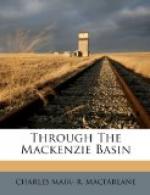At dinner Mr. Wilson told us of a very curious circumstance the previous fall, at the Loon River, some eighty miles south of Vermilion—something, indeed, that very much resembled volcanic action. Indians hunting there were surprised by a great shower of ashes all over the country, thick enough to track moose by, whilst others in canoes were bewildered in dense clouds of smoke. Dr. Wade, a traveller who had just come in from Loon River, said he had discovered three orifices, or “wells,” as he called them, out of which he thought the ashes might have been ejected. As there were no forest fires to account for the phenomena, they were rather puzzling.
We had begun taking depositions almost as soon as we arrived, and had a very busy time, working late and early in order to get away by the first of August. There were some interesting people here, “Old Lizotte” and his wife in particular. He was another of the “Ancient Mariners” who had left Lachine fifty-five years before with Governor Simpson—a man still of unshaken nerve and muscles as hard as iron. One by one these old voyageurs are passing away, and with them and their immediate successors the tradition perishes.
There was another character on the Vermilion stage, namely, old King Beaulieu. His father was a half-breed who had been brought up amongst the Dog Ribs and Copper Indians, and some eighty years back had served as an interpreter at Fort Chipewyan. It was he who at Fort Wedderburne sketched for Franklin with charcoal on the floor the route to the Coppermine River, the sketch being completed to and along the coast by Black Meat, an old Chipewyan Indian. King Beaulieu himself was Warburton Pike’s right-hand man in his trip to the Barren Lands. He had his own story, of course, about the sportsman, which we utterly discredited. He had joined the Indian Treaty here, but repented, almost flinging his payment in our face, and demanding scrip instead. One of his sons asked me if the law against killing buffalo had not come to an end. I said, “No! the law is stricter than ever—very dangerous now to kill buffalo.” Asking him what he thought the band numbered, he said, “About six hundred,” and added, “What are we poor half-breeds to do if we cannot shoot them?” Pointing out the abundance of moose in the country, and that if they shot the buffalo they would soon be exterminated, he still grumbled, and repeated, “What are we poor half-breeds to do?” I have no doubt whatever that they do shoot them, since the band is reported to have diminished to about 250 head. Immediate steps should certainly be taken to punish and prevent poaching, or this band, the only really wild one on the continent, will soon be extinct.




